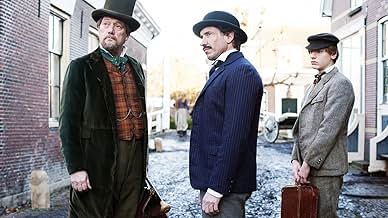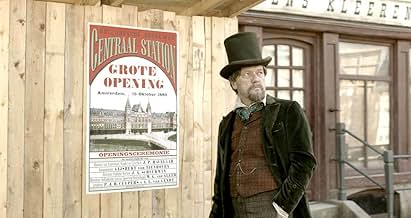Publieke werken
- 2015
- 1h 55m
IMDb RATING
6.7/10
2.5K
YOUR RATING
In 1888 Amsterdam, a stubborn violin maker and his pharmacist cousin face hardship and tragedy as they oppose the powerful businessmen who plan to force him from his house and erect a luxuri... Read allIn 1888 Amsterdam, a stubborn violin maker and his pharmacist cousin face hardship and tragedy as they oppose the powerful businessmen who plan to force him from his house and erect a luxurious new hotel in its place.In 1888 Amsterdam, a stubborn violin maker and his pharmacist cousin face hardship and tragedy as they oppose the powerful businessmen who plan to force him from his house and erect a luxurious new hotel in its place.
- Director
- Writers
- Stars
- Awards
- 2 wins & 12 nominations total
- Director
- Writers
- All cast & crew
- Production, box office & more at IMDbPro
Featured reviews
Despite an expensive production, the narrative is unconvincing. "Value of location" is one of the main topics of the film. Nonetheless, the film does not give the viewer a sense of place.
The choice and ordering of scenes undermine any tension to be build up. The different story lines do not support, but destroy each other. Important changes in the plot are not properly introduced or visually translated. As a result the gradual emotional breakdown of the violin maker, one of the main characters, is not convincing. The end scene of the doctor, the other main character, is so ridiculous and pathetic that it melts down the entire Hoogeveen storyline. Vital themes such as social injustice, or the arrival of modernity are treated as interchangeable backdrop. A relevant storyline is lacking.
By result the causality of the narrative breaks down and all events become arbitrary.
Pretty frustrating, as Rosenboom's success novel must have had all layers in place. A film can never be as rich as a novel, but a film must present those strings that contain the story. That is unfortunately not the case here.
The choice and ordering of scenes undermine any tension to be build up. The different story lines do not support, but destroy each other. Important changes in the plot are not properly introduced or visually translated. As a result the gradual emotional breakdown of the violin maker, one of the main characters, is not convincing. The end scene of the doctor, the other main character, is so ridiculous and pathetic that it melts down the entire Hoogeveen storyline. Vital themes such as social injustice, or the arrival of modernity are treated as interchangeable backdrop. A relevant storyline is lacking.
By result the causality of the narrative breaks down and all events become arbitrary.
Pretty frustrating, as Rosenboom's success novel must have had all layers in place. A film can never be as rich as a novel, but a film must present those strings that contain the story. That is unfortunately not the case here.
Very irritating: the diction of the actors, especially their accents, which is typical of people working for national radio and TV in the Netherlands. "Bekakt Goois". In Hoogeveen.
Based on a fictional Dutch book speculating on how the two 19th century homes that the Victoria Hotel was built around came to be. Amsterdam's Central Station is directly across the street from the Victoria Hotel, which was built in the late 1880's. If you look closely at the hotel you will notice that there are two single dwellings that the hotel was built around. This is the story of how that came to be and it involves three cousins and the attempt to help some poor peat farmers achieve a better life in America.
This is a very sad but well meaning drama. The letter from the peat farmers really saved this from being a total tragedy. I loved the images of the hotel then and the hotel now.
It is the precursor to my city's Up house (which sadly I witnessed the monstrous fitness center, etc being built around a poor old lady's home here in Seattle ), with the exception that in the modern build they made no attempt to make the building beautiful and the owner wasn't holding out for more money...she just wanted to live in peace in her home.
This is a very sad but well meaning drama. The letter from the peat farmers really saved this from being a total tragedy. I loved the images of the hotel then and the hotel now.
It is the precursor to my city's Up house (which sadly I witnessed the monstrous fitness center, etc being built around a poor old lady's home here in Seattle ), with the exception that in the modern build they made no attempt to make the building beautiful and the owner wasn't holding out for more money...she just wanted to live in peace in her home.
Dutch cinema is always a bit of a hit or a miss. There are some great directors and actors (although most actors focus on theater, as with Gijs Scholten van Aschat who is mainly a theater actor), but the movies have little budget and tend to be bland comedy-dramas.
Having said this, budget is being a bit more generous in recent years. Most historical movies from the Netherlands in recent years have a tendency to be action flicks, as with the movies Michiel de Ruyter, Kenau and het Bombardement. Although the visuals due to the higher budgets are stunning (especially in Michiel de Ruyter) they lack a lot in historical accuracy and feeling. Michiel de Ruyter has little historical context and especially the behavior of the characters does not feel like the seventeenth century (children disturbing their father and jumping on his bed for example).
Publieke werken succeeds in grasping the stunning visuals used in those other movies but tell a much more layered and original story. Centered around two cousins (fictional characters to be precise) this movie gives them a lot more temporal feel. The dialogue and behavior of most characters is distant, which is in my humble knowledge mostly accurate and a lot of the feelings the characters are experiencing are oppressed and show just a little. This gives a certain historical distance and I find that praise-worthy. On the downside this makes the plot sometimes a bit hard to follow.
The effect I loved the most is the lighting in this movie. It felt very natural and accurate, scenes at night where mostly lit by oil lamps or candles and the scenes inside are mostly darker even when it is day. Although probably some effect was used to get this it felt as a very natural portrayal of a society where electricity was not readily available, although around the corner, as the movie is set in 1888.
The biggest downside to this movie, coherent to a lot of Dutch movies, was in the audio mixing. For some reason Dutch movies tend to mix the spoken lines softly and the music really loud. Maybe this is due to the reason I watched this movie on television, but still it is a trend. As a native speaker of Dutch this makes some lines for me hard to understand. If you are watching with subtitles this would probably be of no concern to you.
I give this movie 8 out of 10. A historical movie which let you experience the historical distance of his subjects, good acting, magnificent visuals, original plot and deep characters.
Having said this, budget is being a bit more generous in recent years. Most historical movies from the Netherlands in recent years have a tendency to be action flicks, as with the movies Michiel de Ruyter, Kenau and het Bombardement. Although the visuals due to the higher budgets are stunning (especially in Michiel de Ruyter) they lack a lot in historical accuracy and feeling. Michiel de Ruyter has little historical context and especially the behavior of the characters does not feel like the seventeenth century (children disturbing their father and jumping on his bed for example).
Publieke werken succeeds in grasping the stunning visuals used in those other movies but tell a much more layered and original story. Centered around two cousins (fictional characters to be precise) this movie gives them a lot more temporal feel. The dialogue and behavior of most characters is distant, which is in my humble knowledge mostly accurate and a lot of the feelings the characters are experiencing are oppressed and show just a little. This gives a certain historical distance and I find that praise-worthy. On the downside this makes the plot sometimes a bit hard to follow.
The effect I loved the most is the lighting in this movie. It felt very natural and accurate, scenes at night where mostly lit by oil lamps or candles and the scenes inside are mostly darker even when it is day. Although probably some effect was used to get this it felt as a very natural portrayal of a society where electricity was not readily available, although around the corner, as the movie is set in 1888.
The biggest downside to this movie, coherent to a lot of Dutch movies, was in the audio mixing. For some reason Dutch movies tend to mix the spoken lines softly and the music really loud. Maybe this is due to the reason I watched this movie on television, but still it is a trend. As a native speaker of Dutch this makes some lines for me hard to understand. If you are watching with subtitles this would probably be of no concern to you.
I give this movie 8 out of 10. A historical movie which let you experience the historical distance of his subjects, good acting, magnificent visuals, original plot and deep characters.
Visually stunning but with a story that presents a dreary view of late 19th century Amsterdam. A pharmacist and his cousin concoct a plan to emigrate poor peat workers to America when an investor decides to build a luxury hotel and buy up downtown properties. They see an opportunity to pocket some money and offer the peasants a new start in the land of the free. Things don't go well in negotiations lending to some tragic results. Slower paced but excellent performances keep A Noble Intention interesting if flawed.
Did you know
- TriviaThe houses which the real hotel was built around in Amsterdam featured in the story really exist and can be seen on the Prins Hendrikkade.
- GoofsThe colonists sailed in 1889 and arrived in New York a few months later. The statue of liberty is under construction while it was officially opened in 1886.
- How long is A Noble Intention?Powered by Alexa
Details
- Release date
- Country of origin
- Official site
- Languages
- Also known as
- A Noble Intention
- Filming locations
- Production companies
- See more company credits at IMDbPro
Box office
- Budget
- €5,900,000 (estimated)
- Gross worldwide
- $1,790,201
- Runtime
- 1h 55m(115 min)
- Color
- Aspect ratio
- 2.35 : 1
Contribute to this page
Suggest an edit or add missing content



























